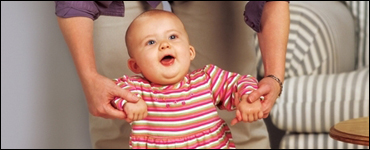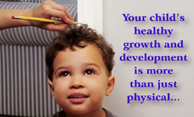CDC Features
Current Features
Detect Autism Early. Learn the Signs of Healthy Child Development.

Do you know all the ways you should measure your child's growth? We naturally think of height and weight, but from birth to 5 years, your child should reach milestones in how he plays, learns, speaks and acts. A delay in any of these areas could be a sign of a developmental problem, even autism. The good news is, the earlier it's recognized the more you can do to help your child reach her full potential.
Skills such as taking a first step, smiling for the first time, and waving "bye bye" are called developmental milestones. Children reach milestones in playing, learning, speaking, behaving, and moving (crawling, walking, etc.). A developmental delay is when your child does not reach these milestones at the same time as other children the same age. If your child is not developing properly, there are things you can do that may help. Most of the time, a developmental problem is not something your child will "grow out of" on his or her own. But with help, your child could reach his or her full potential!
Learn the Signs
Children develop at their own pace, so it's impossible to tell exactly when yours will learn a given skill. The developmental milestones below will give you a general idea of the changes you can expect as your child gets older, but don't be alarmed if your child takes a slightly different course.
Important milestones by the end of:
• 7 Months
Act Early
I have concerns that my child could have autism. Who can I contact in my state to get my child a developmental assessment?
Talk to your child's doctor or nurse if you have concerns about how your child is developing. If you or your doctor think there could be a problem, you can take your child to see a developmental pediatrician or other specialist, and you can contact your local early intervention agency (for children under 3) or public school (for children 3 and older) for help. To find out who to speak to in your area, you can contact the National Dissemination Center for Children with Disabilities by logging on to http://www.nichcy.org/* or calling 1-800-695-0285. In addition, the Centers for Disease Control and Prevention (CDC) has developed a resource Web page for families. If there is a problem, it is very important to get your child help as soon as possible.
General Developmental Screening and Surveillance
The diagnosis of an autism spectrum disorder takes two steps. The first step is developmental screening and surveillance during well-child doctor visits. Doctors and nurses use developmental screening to tell if children are learning basic skills when they should, or if they might have problems. Your child's doctor may ask you questions or talk and play with your child during an exam to see how he or she learns, speaks, behaves, and moves. Since there is no lab or blood test to tell if your child may have a delay, the developmental screening will help tell if your child needs to see a specialist.
Screening tests used solely for identifying children with developmental disabilities should be given to all children during the
9-month, 18-month, and 24- or 30-month well-child visits. If your child's health care professional does not routinely check your child with such a test, ask that it be done.
Autism Spectrum Disorder-Specific Developmental Screening
Screening for autism spectrum disorders is one way to improve early identification of children who need of more in-depth evaluation. Early intervention may be vital in preventing a cascade of problems that may affect later functioning. All children should be screened for autism spectrum disorders at the 18-, 24-, and 30-month “well-child” visits. Additional screening may be needed if a child is at high risk for an autism spectrum disorder (has a sibling or parent with an autism spectrum disorder) or if symptoms warrant.
Need more information about screening? These screening resources with links to autism screening tools and their descriptions from the American Academy of Pediatrics (AAP) may help.
Why is developmental screening important?
When a developmental delay is not recognized early, children must wait to get the help they need. This can make it hard for them to learn when they start school. In the United States, 17 percent of children have a developmental or behavioral disability such as autism, intellectual disability (also known as mental retardation), or Attention-Deficit/Hyperactivity Disorder (ADHD). In addition, many children have delays in language or other areas. But, less than half of children with problems are identified before starting school. During this time, the child could have received help for these problems and may even have entered school more ready to learn.
How can I help my child's development?
Proper nutrition, exercise, and rest are very important for children's health and development. Providing a safe and loving home and spending time with your child – playing, singing, reading, and even just talking – can also make a big difference in his or her development.
Need more information to help your child's development? This Web page provides some positive parenting tips with ideas for activities to do with your child and important child safety information.
For More Information
- CDC's Learn the Signs. Act Early. Campaign
- Information and Resources for Health Care Professionals
- Information and Resources for Child Care Providers
- CDC's Autism Information Center
*Links to non-federal organizations are provided solely as a service to our users. These links do not constitute an endorsement of these organizations or their programs by CDC or the federal government, and none should be inferred. CDC is not responsible for the content of the individual organization Web pages found at these links.
Page last updated: April 14, 2008
Content source:National Center on Birth Defects and Developmental Disabilities
Content owner: National Center for Health Marketing
URL for this page: www.cdc.gov/Features/DetectAutism


